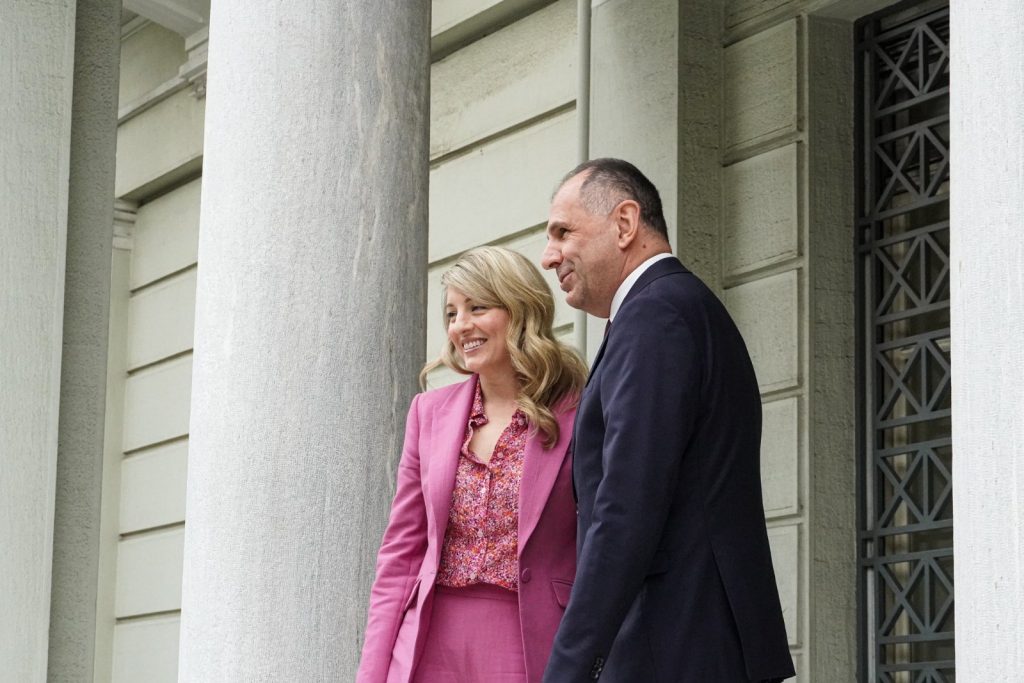A few hours after her final meeting in Athens, the last stop on a tour of Lebanon, Turkey, Cyprus and Greece focused on the crisis in the Middle East, the Canadian Foreign Minister spoke to Ta Nea about the state of Greece-Canada bilateral relations, the new partnerships in the making between our nations, and the plan that is being drawn up to evacuate Canadians living in Lebanon to Cyprus should the situation suddenly escalate. Before and after the interview, Mélanie Joly noted among other things that Canada’s investments in Greece are at an all-time high of $6 billion, and that there is scope for a further increase. She also dwelled upon her country’s first national action plan for “Women, Peace and Security”, stressing that Canada has a “feminist foreign policy” and that when women are involved in security issues “the peace lasts longer”.
How would you describe the Greek Prime Minister’s visit to Canada last March? Will it be followed by other official Greek visits?
We’ve issued a standing invitation. And I just invited George Gerapetritis to visit Canada. My visit to Athens comes a year after Nikos Dendias’ visit to Canada and six weeks after Kyriakos Mitsotakis’ highly successful visit, which highlighted the robustness of his relationship with (Canadian PM Justin) Trudeau.
I think we are in the golden age of Canada-Greece friendship.
Why would you say that?
Because we are collaborating on so many issues now. First off, we are affected by the international security crisis. We are working together on Ukraine and the conflict in the Middle East between Israel and Hamas. I believe it is more important than ever that we remain firm partners in NATO, and think we could take this relationship to another level. Canada has a lot to offer Greece in terms of energy and security. We saw the announcement of an important purchase of Canadair firefighting aircraft, and I think we can build on that. We are also facing existential threats, which include Climate Change. The Greek people have suffered major fires, and wild fires are raging in Canada as we speak. We must be able to help each other. There is also the important new NATO Climate Change and Security Center of Excellence, which is opening in Montreal and in which Greece has decided to participate. We can also provide Greece with hydrogen and nuclear energy, serve as an energy security partner and collaborate more on meeting out security needs.
Did you discuss any other areas of cooperation during your visit?
Of course, we also talked about geopolitical issues. There is an initiative regarding Ukraine in which Greece has confirmed its participation. We want to repatriate 20,000 Ukrainian children who have been illegally transported into Russia. To this end, we have launched an International Coalition that Greece has decided to join.
How do you see Greece’s role today in relation to geopolitical developments?
I am here in Greece as part of a larger tour. I have visited Cyprus, Lebanon, Turkey and now Greece to discuss the security situation in the Middle East and the humanitarian crisis in Gaza. As it stands, we are in full agreement with Greece on every issue. The purpose of my tour was to exchange information, strengthen our positions and ensure we could support the new sea corridor—which Greece, of course, supports—from Cyprus to Gaza and the new port the US has built there. Canada considers Greece a staunch ally and a dear friend.
We know that you are drawing up a plan to evacuate Canadians living in Lebanon to Cyprus, if necessary…
On my tour, I spoke with officials in Cyprus, Turkey and Greece about the plan to evacuate Canadians from Lebanon in the event of war between Israel and Hezbollah. We hope it won’t happen, but we must be prepared for every eventuality. And, of course, in Lebanon I met the team that would be responsible for implementing an evacuation. My message to Canadians in Lebanon over the past seven months has been this: “It’s time to come home.”
You’re extremely concerned about the situation there…
Of course I am. Who wouldn’t be? My job is to point out the risks to Canadians traveling abroad. Commercial flights are still being arranged for the 45,000 Canadians currently in Lebanon, who will have to return home.
Do you consider it positive that Greece and Turkey are experiencing a period of relative calm in their relations amidst so much tension in the region?
Yes. Given the number of conflicts ongoing in the region, the fact that Greece-Turkey relations have taken a turn for the better can only be seen as good news. We will always do our best to work with both countries to promote peace and stability. This is what the Greek and Turkish peoples need, and it’s what NATO needs, too. That both countries are NATO member states is important.
Are you planning your moves on the basis of an escalation in the Middle East?
Yes. Of course. I have always feared an escalation. That is why we are calling for a ceasefire in Gaza. The hostages must be released and we must ensure that Hamas surrenders its weapons. Humanitarian aid must reach Gaza. At a more fundamental level, what the region needs is the creation of a Palestinian state that can coexist peacefully and securely with the state of Israel. It is also crucial the nations in the region recognize both.
During your meeting with Hakan Fidan, did you talk about Hamas?
We consider Hamas to be a terrorist organization. And we stand by that position. Nonetheless, we will cooperate with any country that is in a position to bring Hamas to the negotiating table, so a ceasefire can be achieved and Hamas ceases to pose a threat to the Israelis.




